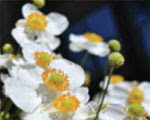Will your plants survive?
How to cope with a wishy-washy spring
 Last week we were dodging golf-ball hail stones. This week has brought a change-up from sandals to snow boots. The latest weather extravaganza along the Front Range has left people and plants confused over whether spring will ever arrive.
Last week we were dodging golf-ball hail stones. This week has brought a change-up from sandals to snow boots. The latest weather extravaganza along the Front Range has left people and plants confused over whether spring will ever arrive.
When Mother Nature gets wishy-washy in the springtime, what should we expect?
- Fruit trees will likely not have peaches, apples or apricots this season.
- Crabapples: since they bloom over time, some may set fruit and survive. Others may be questionable for fruiting. Successful fruit production depends on the size of the fruit at the time of the freeze.
- Ash, maple and honey locust whose leaves browned out in an earlier freeze will likely come back with expanding secondary leaves. Make sure trees receive adequate water to avoid drought stress and apply appropriate fertilizer.
- Perennials that have not yet flowered should move into the season with few effects. Flowers on early-blooming plants, such as lilacs and forsythia, may have been lost to the freeze. The weight of the snow may have pushed blossoms and petals off many blooming plants. Peonies may have broken stems. Late-blooming stiff-stem iris should survive. While it’s painful to use showy blooms, the plants themselves should recover and rebound.
- Tender annual veggies – tomatoes, green peppers and emerging seedlings – are likely lost unless protected from the freeze. Temps tonight will again hover near freezing, so keep freeze protection in place another night and monitor the forecast.
What will plants need after this weather roller-coaster?
- Veggies and annual flowers that did not survive need to be replanted.
- Trees and shrubs may need selective pruning to remove storm damage. Splayed plants may need bundling to restore their shape.
- Perennials are tough, snow storm survivors and will likely recover with some pruning and TLC. Provide adequate water and fertilizer and monitor for pest infestations.
The consolation prize in this latest weather event is that there will be fewer ash seeds falling and sprouting in beds and lawns. There will be less cottonwood cotton floating in the air.
The best plant Rx is to keep plants healthy and unstressed. Healthy plants are more resistant to insects and diseases. If you must replace some of your plants, select varieties most likely to survive in Colorado’s challenging climate.
This entry was posted in
DIY,
Lawn & Garden Care



